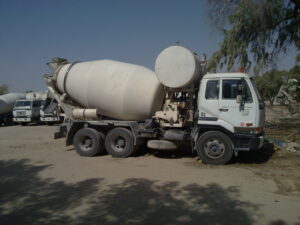The specific gravity of cement is the ratio of its density compared to the density of water. It typically ranges around 3.15.
Specific gravity plays a crucial role in the properties and quality of cement. It helps determine the mix proportions and workability of concrete. A higher specific gravity usually indicates better-quality cement. This measurement is essential for civil engineers and builders to ensure the structural integrity of construction projects.
Accurately knowing the specific gravity allows for precise calculations in mix design, leading to optimal performance of the cement in various applications. Understanding this property can help avoid potential issues related to concrete setting and durability. Therefore, it is a key factor in construction and material science.
Introduction To Specific Gravity Of Cement
The specific gravity of cement is a key property in construction. It measures the density of cement compared to water. This value helps in calculating the mix design of concrete. Understanding specific gravity ensures the quality and strength of the concrete mix.
The Role Of Specific Gravity In Cement Quality
Specific gravity affects the quality of cement. Cement with a higher specific gravity indicates a denser material. This means it contains fewer voids and impurities. A lower specific gravity suggests the presence of air gaps and other foreign materials. These can weaken the final structure.
| Property | High Specific Gravity | Low Specific Gravity |
|---|---|---|
| Density | High | Low |
| Void Content | Few Voids | More Voids |
| Impurities | Less | More |
Impact On Concrete Mix Design
The specific gravity of cement plays a vital role in concrete mix design. It helps in determining the proportion of materials needed. A higher specific gravity requires a different mix ratio than a lower one.
- Calculates the correct volume of cement needed.
- Affects the water-cement ratio.
- Influences the strength and durability of the concrete.
Engineers use specific gravity to ensure the right mix proportions. This ensures the concrete achieves the desired strength and durability.

Credit: theconstructor.org
Decoding Specific Gravity
Understanding the specific gravity of cement is crucial for construction projects. It helps in calculating the mix design and ensuring the quality of concrete. Let’s delve into the basic principles of specific gravity and compare it with other materials.
Basic Principles Of Specific Gravity
Specific gravity is a measure of the density of a material compared to the density of water. For cement, this value is essential in concrete mix designs. The specific gravity of cement usually ranges from 3.1 to 3.16.
This value indicates that cement is roughly three times denser than water. Accurate measurements ensure the right proportions in the mix, leading to strong and durable concrete.
Comparison With Other Materials
Here’s a comparison of the specific gravity of cement with other common construction materials:
| Material | Specific Gravity |
|---|---|
| Cement | 3.1 – 3.16 |
| Sand | 2.6 – 2.7 |
| Aggregate | 2.4 – 2.9 |
| Water | 1.0 |
As seen in the table, cement has a higher specific gravity compared to sand and aggregates. This means cement is denser and heavier. Knowing these values helps in achieving the correct mix for concrete, ensuring its strength and durability.
The Importance Of Testing Cement’s Specific Gravity
Understanding the specific gravity of cement is crucial in the construction industry. It plays a vital role in ensuring the quality and durability of structures. Specific gravity is the ratio of the density of cement to the density of a reference substance, typically water. This measurement helps in identifying the cement’s composition and quality.
Testing the specific gravity of cement helps in predicting the strength and stability of concrete mixtures. It ensures that the cement used meets the required standards for construction projects. This test is essential for achieving optimal performance and longevity of the structures.
Quality Control In Construction
Quality control is a critical aspect of any construction project. Accurate testing of cement’s specific gravity helps in maintaining consistent quality. It ensures that the cement used in construction is reliable and meets the necessary specifications.
By regularly testing cement’s specific gravity, engineers can detect any variations or impurities. This allows for timely adjustments and corrections, ensuring the overall quality of the construction materials. It also helps in preventing potential structural failures caused by substandard cement.
Predicting Concrete Strength
Specific gravity testing is essential for predicting the strength of concrete. The specific gravity of cement affects the water-cement ratio, which in turn influences the concrete’s compressive strength. A proper balance between water and cement ensures a strong and durable concrete mix.
By understanding the specific gravity of cement, construction professionals can design concrete mixes with optimal strength. This helps in creating structures that can withstand various loads and stresses. It also contributes to the longevity and safety of the buildings.
| Property | Importance |
|---|---|
| Specific Gravity | Determines cement quality and composition |
| Quality Control | Ensures consistent and reliable cement |
| Concrete Strength | Predicts the durability and stability of structures |
In conclusion, testing the specific gravity of cement is a fundamental step in any construction project. It ensures quality control and helps in predicting the strength of concrete, leading to safe and durable structures.

Credit: civilinformers.medium.com
Methods For Determining Specific Gravity
Understanding the specific gravity of cement is crucial for various construction processes. It helps in calculating the mix proportions and ensures the quality of the cement. There are several methods to determine the specific gravity of cement. Below are the most common and reliable methods:
Le Chatelier’s Flask Method
The Le Chatelier’s Flask Method is a traditional technique used to determine the specific gravity of cement. This method involves the use of a Le Chatelier flask, which is a special type of flask designed for this purpose.
- Fill the flask with kerosene up to the zero mark.
- Weigh a certain quantity of cement, usually 64 grams.
- Add the cement to the flask gradually and ensure no air bubbles are formed.
- Record the final level of kerosene in the flask.
- Calculate the specific gravity using the formula:
Specific Gravity (G) = Weight of Cement / (Final Volume - Initial Volume)This method is widely used due to its simplicity and accuracy.
Pycnometer Method
The Pycnometer Method is another reliable way to determine the specific gravity of cement. A pycnometer is a type of flask with a precise volume measurement.
- Weigh the empty pycnometer and record its weight.
- Fill the pycnometer with kerosene and weigh it again.
- Empty the pycnometer and fill it halfway with cement.
- Add kerosene to fill the remaining volume and weigh it.
- Calculate the specific gravity using the following formula:
Specific Gravity (G) = (Weight of Cement) / (Weight of Pycnometer + Kerosene - Weight of Pycnometer with Cement and Kerosene)This method is preferred for its accuracy and ease of use.
Factors Affecting Cement’s Specific Gravity
The specific gravity of cement depends on several factors. These factors can change the cement’s weight and performance. Understanding them helps in better construction practices.
Chemical Composition Variations
Cement is a mix of various chemicals. The chemical composition impacts its specific gravity. For example, the presence of more silica or alumina can change the specific gravity.
Here is a simple table to show how different chemicals affect specific gravity:
| Chemical | Effect on Specific Gravity |
|---|---|
| Silica | Increases specific gravity |
| Alumina | Decreases specific gravity |
| Iron Oxide | Variable effect |
Fineness And Particle Size Distribution
The fineness of cement is crucial. Finer cement particles pack better and have a higher specific gravity. Larger particles result in lower specific gravity.
Particle size distribution also plays a role. Uniform particles lead to higher specific gravity. Uneven sizes lower the specific gravity.
Consider this list:
- Finer particles = Higher specific gravity
- Coarser particles = Lower specific gravity
- Uniform distribution = Higher specific gravity
- Uneven distribution = Lower specific gravity
Both fineness and particle size distribution can be controlled during manufacturing. This ensures consistent quality and performance.
Interpreting Test Results
Interpreting the test results for the specific gravity of cement is crucial. It helps in understanding the quality and suitability of cement for construction. Knowing how to read and analyze these results ensures that you can make informed decisions. Let’s dive into the details.
Normal Range For Cement Specific Gravity
The specific gravity of cement usually ranges from 3.1 to 3.16. This range indicates the density of the cement compared to water. A value within this range signifies good quality cement.
Here is a simple table to illustrate the normal range for cement specific gravity:
| Specific Gravity | Quality of Cement |
|---|---|
| 3.1 – 3.16 | Normal |
| Below 3.1 | Poor |
| Above 3.16 | High Density |
Dealing With Anomalies
If the specific gravity falls outside the normal range, it may indicate issues. For example, a value below 3.1 might suggest the presence of impurities. This can affect the strength and durability of the cement.
To deal with anomalies:
- Re-test the sample to confirm the results.
- Check for possible contamination in the sample.
- Consult with a materials engineer for further analysis.
By paying attention to these details, you can ensure the cement used in your projects meets the required standards.
Practical Applications In The Field
Understanding the specific gravity of cement is crucial for construction experts. It directly impacts the quality and durability of concrete structures. This section will explore its practical applications in the field through two main areas: Mix Proportioning Adjustments and Cement Quality Assurance.
Mix Proportioning Adjustments
Adjusting the mix proportions based on the specific gravity of cement ensures optimal performance. Concrete mixtures must have the right balance of components.
Here’s how specific gravity influences mix proportions:
- Accurate Volume Calculation: Specific gravity helps determine the precise volume of cement needed.
- Strength and Durability: Correct mix proportions enhance the concrete’s strength and durability.
- Workability: Proper adjustments ensure the mixture is easy to work with.
For example, a cement with a higher specific gravity will require adjustments in the water-cement ratio. This maintains the mix’s consistency and workability.
Cement Quality Assurance
Specific gravity also serves as a key metric for cement quality assurance. It verifies the cement’s authenticity and consistency. Regular checks using specific gravity can detect variations in quality.
Here are some benefits:
- Consistency Check: Ensures the cement’s consistency aligns with industry standards.
- Material Verification: Confirms the cement is genuine and free from adulteration.
- Batch Comparison: Compares different batches for uniformity.
Using a specific gravity test, engineers can avoid potential structural issues. It helps maintain a high standard of construction.
Consider the following table which outlines the typical specific gravity values for different types of cement:
| Type of Cement | Specific Gravity Range |
|---|---|
| Ordinary Portland Cement (OPC) | 3.1 – 3.16 |
| Portland Pozzolana Cement (PPC) | 2.9 – 3.1 |
| White Cement | 3.05 – 3.1 |
Advanced Insights
The specific gravity of cement is a key parameter in construction. It influences the mix design and quality of concrete. Advanced research and future trends are shaping the way we understand and use cement.
Research On Specific Gravity Modifications
Recent research aims to modify the specific gravity of cement. Scientists are exploring new additives and materials. These modifications can improve the performance of cement.
Here are some key findings:
- Nanoparticles: Adding nanoparticles can change the specific gravity. It can also enhance the strength and durability of cement.
- Fly Ash: Fly ash is used to reduce the specific gravity. It also helps in making eco-friendly cement.
- Polymers: Polymers can be mixed to adjust the specific gravity. This results in better workability and reduced water demand.
| Material | Effect on Specific Gravity | Benefits |
|---|---|---|
| Nanoparticles | Increase | Enhanced strength and durability |
| Fly Ash | Decrease | Eco-friendly, cost-effective |
| Polymers | Adjustable | Better workability, reduced water demand |
Future Of Cement Formulations
The future of cement is exciting. New formulations are being developed every day. These formulations promise better performance and sustainability.
Here are some trends to watch:
- Geopolymer Cement: Uses industrial waste and reduces carbon footprint.
- Carbon Capture Cement: Captures CO2 during production, making it greener.
- Self-Healing Cement: Repairs cracks automatically, extending the lifespan of structures.
These advancements are setting new standards in the construction industry. The focus is on making cement more efficient and environmentally friendly.
Is Specific Gravity of Cement Essential for Calculating Cement in Brickwork?
When it comes to building brickwork, understanding the specific gravity of cement is essential for accurately calculating the amount of cement needed. In our calculate cement brickwork tutorial, we explain how specific gravity is used in the calculation process to ensure the right proportions for the strongest and most durable brickwork.
Frequently Asked Questions
What Is Meant By Specific Gravity Of Cement?
Specific gravity of cement measures its density relative to water. It indicates cement’s quality and consistency. Typically, it’s around 3.15.
What Is Meant By Specific Gravity?
Specific gravity is the ratio of a substance’s density to the density of water. It measures relative density.
What Is The Typical Specific Gravity Of Concrete?
The typical specific gravity of concrete ranges from 2.3 to 2.7. This value depends on the mix and aggregate type.
Why Is Specific Gravity Of Cement 3.15 And Density Is 1440?
The specific gravity of cement is 3.15 due to its high density compared to water. Cement’s density is 1440 kg/m³, reflecting its compactness and weight per unit volume. These properties ensure strength and durability in construction.
Conclusion
Understanding the specific gravity of cement is crucial for construction projects. It helps determine the quality and mix design. Accurate measurements ensure the durability and strength of your structures. Always use standard procedures to measure specific gravity for reliable results.
Enhance your construction knowledge by mastering these fundamental concepts.






